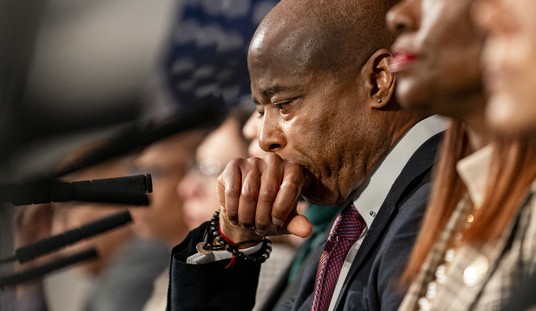Last week, Politico reported on an aborted effort by the American Conservative Union to get FedEx to pay for a $2 million campaign against an effort in the House to impose new regulations from the NLRB onto the carrier that would remove a competitive advantage it has over its chief rival UPS. Politico reported that ACU chair David Keene instead sided with UPS when FedEx turned down the ACU offer. Today, David Keene responded in depth to the charges — and since we covered the issue on Friday, I’m going to post Keene’s response in full, followed by my own.
———-
Last Friday, Politico carried a story alleging that as Chairman of the American Conservative Union I had approached Federal Express seeking a major contribution in return for ACU’s support for the company’s position in a fight with UPS and that when FedEx refused the requested contribution, I reversed my position on the issue and, in effect, threw in with UPS.
Politico’s reporter got his facts and his timing wrong and, as a result, reached conclusions that were wrong. My first inclination was to ignore what I considered an absurd story, but I cannot let such a vicious attack on my integrity and on the organization I chair go unanswered.
I’ve been around and know full well that “politics ain’t beanbag,” but I must say I was disappointed by the readiness of so many people including some who have known me for years to accept the Politico charges as true. Perhaps it’s the cynicism about everything and everyone political, but I have to admit that it took me by surprise.
The issue in question is an amendment to The Federal Aviation Authority Reauthorization Act of 2009 which would, by bringing FedEX under the jurisdiction of the National Labor Relations Board, essentially deliver the company and its employees into the hands of The Teamsters.
The substantive reasons ACU believes conservatives should support FedEx on this were outlined as articulately and succinctly in a recent column by George Will who concluded quite accurately that “What UPS is doing is called rent-seeking — bending public power for private advantage by hindering a competitor.”
First, let me say that ACU did approach FedEx for support to assist in a just fight; we agreed with the corporation’s opposition to the amendment that would subject them to NLRB jurisdiction of the and wanted to do all we could to see that it is defeated.
ACU raises funds from individuals, foundations and, yes, corporations that agree with our positions on the issues and strongly believes that in this particular fight, FedEx is right and that UPS is trying to get Congress to take an objectively unjustifiable action simply to disadvantage a competitor. What ACU does not do is tailor its positions to attract contributors. ACU support is not now and never has been “for sale.”
ACU staff had been working to defeat the amendment even before preparing a funding request after learning that such a request might well be favorably received. That proposal was prepared by the ACU staff and sent to FedEx on June 30, 2009. While I knew a proposal was being prepared, I wasn’t personally familiar with its contents and didn’t even know until recently when or even if it had actually gone to FedEx.
At roughly the same time I was approached by a representative of Frontiers of Freedom, an organization founded and chaired by former Wyoming Senator Malcolm Wallop to see if I would be willing to sign on to a letter to FedEx objecting not to the corporation’s position on the NLRB question, but to characterizing the fight as a fight over a UPS effort to obtain a federal bailout. This was, of course, a mischaracterization of the fight which had nothing to do with a bailout and everything to do with a labor regulation.
Since words have precise meanings and since the letter I was asked to agree to was explicitly agnostic as to the amendment we oppose, I agreed to sign on. This nevertheless apparently upset someone at FedEx who contacted reporters to charge that I had sought FedEx financial support and when it was not forthcoming, switched sides … probably in return for funding from its competitor.
The timeline alone demonstrates the absurdity of the charges. Although the Frontiers of Freedom letter is dated July 15, 2009, the organization sought and received the ok from me to add my name to its letter on July 1, 2009. That is just a day after ACU fundraisers submitted its proposal to FedEx. I don’t know of anyone who believes that any corporation or funding institution would be willing or even capable of turning such a proposal around in a day. One would have to be incredibly naïve to expect an answer of any kind this quickly and we hadn’t gotten one. We certainly hadn’t been turned down.
Had I been interested only in raising money, I would not have signed on to the Frontiers of Freedom letter because by doing so, I was at the very least making it less rather than more likely that they would contribute to our efforts. I signed on, however, because I thought the letter was correct on the merits and because, quite frankly, I was not relating it to the substance of the NLRB issue.
Politico charges that that by signing the Frontiers of Freedom letter, I reversed my position on the amendment ACU had until then opposed. This is simply untrue. Anyone who reads the Frontiers of Freedom letter will discover that it states explicitly that one can agree with the substance of the letter regardless of one’s position on the NLRB issue. I can only conclude that the author of the Politico article never even bothered to read it.
Let me be clear on this. I continue to agree with Senator Wallop’s objection to the mischaracterization of the issue and I also I continue to oppose extending NLRB jurisdiction to FedEx. Neither I nor ACU has changed our position on this and won’t, though I must admit that I am less than impressed with the manner in which FedEx has treated me and ACU in this matter.
Given the nature of the allegations, I guess I should also say for the record that we have neither asked for nor received any support from UPS as a result of our position on this issue. This should surprise no one since we think UPS’s position on the NLRB question is flat wrong and we continue to believe conservatives should oppose that corporation’s attempt to use its influence in Congress to disadvantage its competition.
Years ago when Lyn Nofziger was unjustly charged with wrongdoing, I wrote him a letter in which I told him that the only good thing about the experience was that before it ended he would know who your real friends were and who would walk away from you at the first sign of trouble.
Lyn thanked me for the letter and the thought, but said that on reflection thought he’d rather not to have had to find out.
He had a point.
————-
I appreciate Keene’s points here, but this still doesn’t answer the question of why Whitfield made an offer that appeared to include Keene’s columns at The Hill as part of a promotional effort. Unless Keene is challenging the authenticity of the letter, which he does not do in this statement provided to Hot Air, that letter at least strongly implied that the ACU could sell his column as part of its offer. In fact, it’s hard to see how this could be read otherwise:
Producing op-eds and articles written by ACU’s Chairman David Keene and / or other members of the ACU’s Board of Directors. (Note that Mr. Keene writes a weekly column that appears in The Hill.)
That doesn’t mean that Keene or the unnamed board members will write a column for any cause that throws down cash. However, unless the column contains some sort of disclosure that it was written as part of a multimillion-dollar deal with an ACU client, it’s still pay-for-play, which was what Politico reported. It is remarkably similar to what Armstrong Williams did a few years ago, and received an avalanche of richly deserved criticism across the entire political spectrum, because it was wrong no matter whether Williams believed what he was writing or not. The readers had an interest in knowing the pay-for-play relationship as a means of judging credibility, and the same would be true if Keene agreed to put his columns at the disposal of ACU clients.
That brings us to the Lyn Nofziger point, which I find a little odd. Keene says that he publicly criticized FedEx in an open letter, and in the same breath says he still supports their cause. However, he doesn’t seem to allow for the same of the ACU’s critics in this instance, considering us to have betrayed the ACU. Well, I have my friends and defend them when they deserve it — and tell them when they’re wrong when they deserve that, too, the same as Keene did with FedEx. I’d like to point out that I called the ACU to get their side of the story, and until now have never received a response to that call.
The measure of “friendship” in politics can’t be the extent to which we ignore when our colleagues make mistakes big enough to cause serious damage — as Keene explains about his response to FedEx, and as a pay-for-play practice at the ACU would do to conservatives. I’m happy to stick with that standard. I’m also happy to give David Keene a chance to get his entire argument on the record, as he has been a good friend of the conservative movement for many years.
Update: Be sure to read Erick Erickson’s post. He spoke with Keene directly, but still comes away convinced that the ACU needs to make changes at the top to retain its credibility.








Join the conversation as a VIP Member